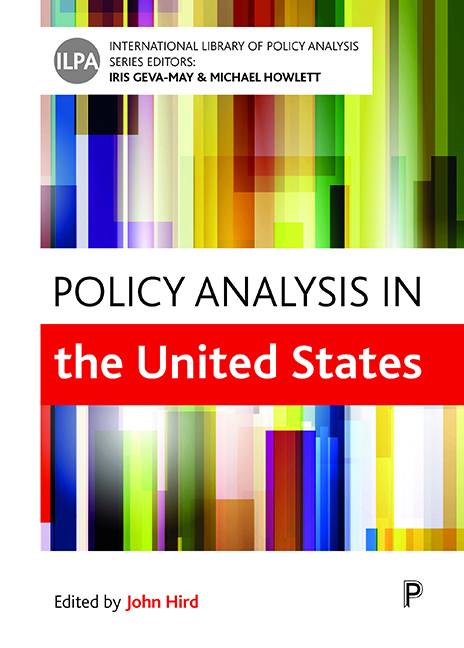Book contents
- Frontmatter
- Contents
- List of tables and figures
- Notes on contributors
- Editors’ introduction to the series
- Introduction
- Part One History, styles, and methods of policy analysis in the United States
- Part Two Policy analysis by governments
- Part Three Policy analysis outside of government
- Part Four Policy analysis education and impact internationally
- Index
Seventeen - The status of the profession: the role of PhD and masters programs in public policy education
Published online by Cambridge University Press: 12 April 2022
- Frontmatter
- Contents
- List of tables and figures
- Notes on contributors
- Editors’ introduction to the series
- Introduction
- Part One History, styles, and methods of policy analysis in the United States
- Part Two Policy analysis by governments
- Part Three Policy analysis outside of government
- Part Four Policy analysis education and impact internationally
- Index
Summary
Introduction
The United States is at the center of public policy analysis worldwide and thus it should come as no surprise that U.S. higher education programs for public policy and policy analysis are standard bearers for programs elsewhere (Geva-May and Maslove 2006. See also Peters in this volume). U.S. programs for public affairs education were established and crystallized before their counterparts elsewhere, but beyond the mere temporal sequencing, there is considerable evidence that U.S. programs served as a model for shaping the curriculum content and delivery methods established elsewhere, as well as influencing ideas about how to assess quality and on what criteria to accredit such programs (Geva-May et al. 2008). In some respects, the widespread influence of U.S. policy education is unremarkable, however when we consider the extent to which program design and pedagogy reflect the unique historical, economic, political, and cultural contexts of any society (Geva-May et al. 2008), it becomes evident that an understanding of how and why public policy education developed in the United States is important. This chapter traces the evolution of graduate-level public affairs education in the United States in terms of focus, mission, curriculum, institutional locus, and enrollments, and highlights the role of two key professional associations in the evolution of the field. It also highlights some persistent challenges regarding how broadly or narrowly to define the field, how clearly to differentiate among the related fields of study, and how to define and ensure quality.
Terminology
There is a striking absence of precision in the terminology surrounding public policy education in the United States. The terms public policy, public administration, public affairs, public management, policy analysis, policy studies, and public service are alternatively used interchangeably and presented in contrast to one another. This chapter applies a broad definition of public policy education, encompassing not only degrees titled Master of Public Policy or Ph.D. in Public Policy, but also those in Public Administration, Public Affairs, or related fields with a policy component. In doing so, the chapter perpetuates the widespread practice of using terms interchangeably. Despite strong assertions about the importance of clear distinctions in program content and delivery across these fields, the reality is that ‘blurry borders’ (Geva-May and Maslove 2006, p 415) and lack of precision of degree titles remains a characteristic of U.S. public affairs education.
- Type
- Chapter
- Information
- Policy Analysis in the United States , pp. 319 - 338Publisher: Bristol University PressPrint publication year: 2018



